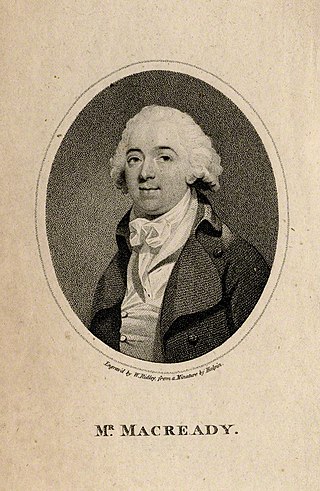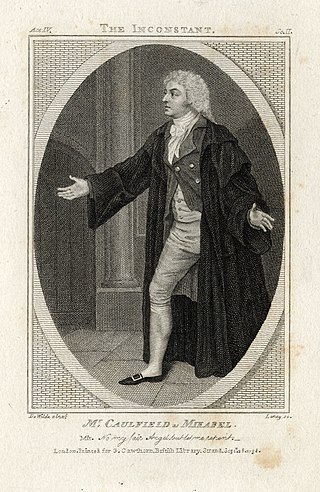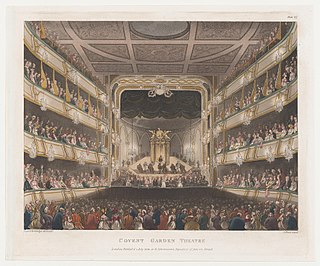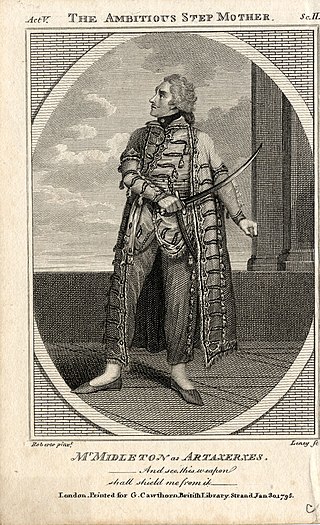
John Fawcett was an English actor and playwright.

William Macready the Elder (1755–1829) was an Irish actor-manager.
Charlotte Tidswell was an English actress.
William Mills (1701–1750) was a British stage actor.
Elizabeth James was an English stage actress of the seventeenth century. She was a member of the King's Company, based at the Theatre Royal, Drury Lane. Several of her known performances were in the premieres of work by John Dryden. She also featured in the debut of William Wycherley's The Country Wife in 1675. Her last known stage role was in 1676, although it appears she was still in the public eye more than a decade later.

William Barrymore was a British stage actor. Originally from Taunton he was part of a company of strolling players in the West Country, and was acting at Plymouth in 1780. He first appeared at the Theatre Royal, Drury Lane in 1782, under the management of Richard Sheridan, and became a long-standing member of the company. He is also the namesake of the famed Barrymore family.

Ralph Wewitzer (1748–1825) was an English actor. He won critical acclaim in supporting parts, but was never given leading roles. He had a 44-year acting career, and is thought to have learned over 400 speaking parts.
Montague Talbot (1774–1831) was an Irish stage actor and theatre manager.

Thomas Caulfield (1766–1815) was a British stage actor who after a period in London's West End spent the later part of his career in the United States.

Nannette Johnston was a British stage actress and dancer active during the Regency era. She was born in London as the daughter the actor William Parker, but educated in Edinburgh where her father was working and began her career as a dancer. In 1796 she married the actor Henry Erskine Johnston, with whom she had six children, and the then went to Dublin for a season before heading to London where she acted at Covent Garden and the Haymarket. They both moved to Drury Lane for two seasons, before returning to Covent Garden.
John Waddy (1751–1814) was an Irish stage actor and theatre manager. Originally, intended for a career in law, he was acting at Dublin's Smock Alley Theatre by 1774, combining this with appearances at Irish and English provincial theatres. From 1782 to 1796, he was a regular at the Theatre Royal, Norwich. He was then engaged by the Theatre Royal, Covent Garden in London making his debut there on 5 October 1796, under the management of Thomas Harris. He acted there and at Haymarket over the next decade and a half. He particularly specialised in playing Stage Irishman and also took over many roles when John Quick left Covent Garden. His second wife, billed as Mrs. Waddy, acted with him in London for several years. He departed from the Covent Garden company in 1810, and worked for a while at the Surrey Theatre south of the River Thames. He died in Oakingham in Berkshire on 12 April 1814.

William Claremont was a British stage actor who spent many years in the companies of the leading London theatres at Covent Garden, Haymarket and Drury Lane. He was born William Cleaver in London as the son of a shop assistant and a deliveryman and was originally apprenticed to a linen merchant. His first known acting roles were in Margate in 1792 and from 1793 he was a regular at Covent Garden. During the summers he also appeared at Richmond and Birmingham. He continued at Covent Garden until 1805 when he switched to Drury Lane and remained there until 1822.
Elizabeth Hopkins (1731–1801) was an English stage actress of the eighteenth century. Born as Elizabeth Barton to a publican in York, she married the actor William Hopkins in 1753. and he introduced her to the stage. They acted together in the provinces and then in Edinburgh where she was original Anna in John Home's Douglas in 1756. She then went to Dublin to perform at the Smock Alley Theatre and elsewhere, although she was at one point dismissed by the company by Thomas Sheridan. When her husband was appointed as prompter at the Theatre Royal, Drury Lane in London she joined the company there, making her first appearance there in 1761. For several decades she was an integral part of the Drury Lane company, occasionally appearing elsewhere in the summer including at Richmond and the Theatre Royal, Haymarket. She transitioned in the 1780s from the younger, tragic roles she had played to older character parts such as dowagers Her final appearance was at the Haymarket in 1796. The actress Priscilla Kemble, wife of John Philip Kemble, was her daughter.
William Davies (1751–1809) was an English stage actor and singer. Born in London, Davies began his career in the provinces including at Norwich before coming to Richmond Theatre in the summer of 1770. He made his London debut at the Theatre Royal, Drury Lane in September that year and joined the company which was under the management of David Garrick and later Richard Brinsley Sheridan. In 1780 he transferred to the company of the Theatre Royal, Covent Garden and remained there for the next fourteen years, interspersing it with summer appearances at the Haymarket where he continued to appear until 1799. He died in 1809 was buried at St Paul's Church in Covent Garden. His wife Elizabeth Davies also acted alongside him at Norwich and Drury Lane before her death in 1782.
Walter Maddocks was an English stage actor and singer. He was born in Chester and was originally a schoolmaster before becoming a professional actor in the provinces appearing at the Theatre Royal, Norwich and elsewhere before he arrived at the Theatre Royal, Drury Lane in 1789. He remained with the Drury Lane company for three decades, playing supporting roles in a wide variety of productions. His wife, billed as Mrs Maddocks, appeared alongside him in provincial theatre and at Drury Lane. His surname is sometimes written as Maddox or Mattocks.

James Middleton (c.1769–1799) was an Irish stage actor. He was born in Dublin as James Magan, the son of a surgeon. He was originally intended for a career in medicine, but chose to take up acting again. He made his debut at the Theatre Royal, Bath on 31 January 1888 in Othello, his voice being compared to Spranger Barry, and adopted his stage name soon afterwards. The same year he appeared at Covent Garden in London but his free-spending and unpredictable behaviour led to him being released at the end of the season. His wife also died around this time, but he rebuilt his career at Crow Street Theatre in his native Dublin and also appeared in Waterford, Cork and Belfast. In 1793 he was rehired by Covent Garden and established himself as a major figure in the company over the following three seasons. However his heavy drinking led to him again being dismissed in 1796, briefly returned to Dublin, and then was engaged at the Theatre Royal, Drury Lane. He died while intoxicated in 1799.
Ursula Agnes Booth (1740–1803) was a British stage actress of the eighteenth century. She first appeared at the Theatre Royal, Covent Garden in London on 1 November 1775, but at the season switched to the rival Theatre Royal, Drury Lane and remained a part of the company for the next twenty years under the management of Richard Brinsley Sheridan. She specialised in character roles of older woman. She also appeared in the summers at the Haymarket. Her husband John Booth was the resident tailor at Drury Lane. She was the mother of the actress Elizabeth Field who married the actor William Wallack and was therefore the grandmother of James William Wallack and Henry John Wallack.

George Bland (c.1758–1807) was an Irish-stage actor and singer. He was the son of the actor Francis Bland and the actress Grace Phillips and the brother of Dorothea Jordan. Abandoning planned studies at Oxford University he appeared as an actor in the provinces, was on the payroll at Theatre Royal, Drury Lane in London in 1786 but appeared in no known roles. He continued to act at in the North of England at Leeds and Liverpool while his sister lobbied the Drury Lane management to give him permanent employment. He was at last hired in 1790 and became a member of the Drury Lane company until 1795, also appearing at the Haymarket in the summer.
Ann Heard (1750–1797) was an English stage actress and dancer. Born Ann Madden, she first appeared at the King's Theatre in London under the management of Spranger Barry in 1766. After dancing at Drury Lane the following year she joined the Theatre Royal, Covent Garden and continued to dance there until 1777. In 1771 she married William Heard, a physician and minor playwright with whom she had a daughter Elizabeth Heard. In 1783 she joined the company at Drury Lane, along with her daughter who performed as a child actor. By now she focuses principally on acting roles, often playing soubrettes. She remained at Drury Lane for the rest of her life, also appearing at Richmond and the Haymarket. Her daughter was also acting at both theatres, but was billed as Miss Heard to distinguish her from her mother.

Robert Benson (1765–1796) was an English stage actor of the eighteenth century. The son of two actors, he made his first London appearance at the Theatre Royal, Haymarket in 1778 as a child actor playing the Duke of York in Richard III and acted occasionally at the Theatre Royal, Drury Lane over the following years. After an absence of some time, he returned to Drury Lane in November 1786 having now graduated to adult roles. He became a reliable member of the company known for his character roles as comic eccentrics and smooth young gentleman. For the summer of 1791 he took over the management of Richmond Theatre with James Thompson and William Macready. He also acted at Haymarket during the summers and authored an operatic farce Britain's Glory which premiered there in 1795. In 1783 he married the actress Susanna Satchell (1758–1814), the sister of Elizabeth Satchell.










